CIA Sponsored Terror, Civil Liberties, Crony Capitalism, Guantanamo, Habeas Corpus, Human Rights, Military Tribunal, Political Prisoner, Prison Industry, Prosecution of the Bush Administration, Supreme Court, Surveillance, Targeting Muslims, Torture
Podcast: Play in new window | Download
Updates:
- Prisoner’s Hunger Strike: Pelican Bay Prison, Guantanamo Bay Prison, Palestinians In Israeli Prisons
- CCR Lawsuit – Pelican Bay Prisoner Class Action
- 20 Plus Palestinians On Hunger Strike In Israeli Prisons Demand Better Conditions For Pelican Bay Prisoners
- Federal Judge Gladys Kessler Says the President Is The One To Stop Force Feeding and Release Cleared Guantanamo Bay Detainees
- Bradley Manning Trial: Important Proceedings During Defense Case At Ft Meade, Maryland
—-
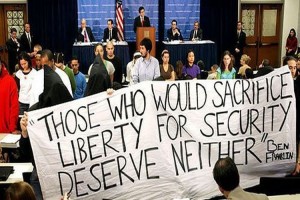

Secret Federal FISA Court Advocate of National Security State
Here on Law and Disorder we’ve discussed the process of the US government expanding its power to get wiretapping permission from the Foreign Intelligence Surveillance Court or FISA court. This is under a provision called section 215 of the Patriot Act which if listeners might recall was set to expire in 2009. It did not. We discussed how the FISA court will be accessed by what’s called Lone Wolf Authority or National Security Letter Authority whereby the FBI can write a letter to the court without suspicion of terrorism and get bank, telephone and internet records.
The 11-member FISA Court has been central to allowing a massive surveillance state to exist by granting US agencies such as the NSA access to private telecommunication data. Today, the FISA court essentially operates as an advocate for the national security state. It’s judicial oversight now parallels the Supreme Court. But more troubling, these FISA Court Justices operate in complete secrecy and base their decisions from hearing only one side the argument, the US government’s.
Attorney Scott Horton:
- The Nixon Administration attempted to use “intelligence gathering” as a justification. Congress reacted to that by saying we’re not going to agree that the government has the right to wiretap people in the United States on the grounds of intelligence gathering. We’re going to require this judicial check, so Congress created this special court the FISA court.
- The court has been around for a long time, but its become a far more significant entity doing much more work after 9/11.
- It has 11 judges. The judges are selected by the Chief Justice of the Supreme Court, John Roberts.
- The judges are picked from courts all around the country.
- It’s not a secret court in that we know that it exists. It IS a secret court in that it operates in secret.
- Literally, the public doesn’t know what papers are filed with it and doesn’t know about its decision.
- That’s a highly controversial matter because decisions by federal courts constitute law.
- This means that this court is manufacturing secret law that the people don’t know about.
- We don’t know the jurisprudence of this court, we don’t know its decisions, we don’t know the full rationale for all its decisions because most of them have been secret.
- It is very aggressively expanding the power and authority of the NSA in surveillance areas.
- This is a court picked by Roberts who share his attitude. Out of 11 judges we have 10 Republican appointees. It’s very well known that Roberts in making appointments here looks very closely to select only judges who reflect his attitudes about the national security state.
- It is a cherry picked court. A movement conservative perspective which is quite hostile to civil liberties.
- The court has become an advocate for national intelligence services.
- It really puts the whole institution of the court under a cloud right now.
- If you want to disperse that cloud you would make sure those judges are representatives of the country.
- The legal reasoning and interpretation of statutes that should be there for people to see and know and understand and criticize.
- Telecoms: Here they are service providers dealing with consumers, lying to their clients and allowing the government free access to all this information.
- That is a criminal act under various statutes of states including New Jersey and Maine. That have rules that say they may not allow governments, investigators access to this information other than pursuant to a government subpoena or court order.
- This court is sweeping away core rights and making a joke out of the 4th Amendment.
- Whistle-blower damage control strategy: A program to deflect attention from the disclosures themselves.
- There is a move afoot to take this out on the American service providers who cooperate with the NSA, Verizon, AT&T. . .Google and so forth.
Guest – Scott Horton, human rights lawyer and contributing editor to Harper’s Magazine. Scott’s column – No Comment. He graduated Texas Law School in Austin with a JD and was a partner in a large New York law firm, Patterson Belknap Webb & Tyler.
—-


Left Forum 2013: Ron Reosti
Capitalists are not necessary to run firms, nor to run macro-economies and investment says Ron Reosti in his presentation at the Left Forum Panel titled Imagine Living In A Socialist USA, Part 2: Making The American Socialist Revolution.
Speaker – Ron Reosti, his Italian parents imparted to him a working-class identity, a sense of social justice, a belief in the possibility of social change, a commitment to democracy, and a hatred of the undemocratic ruling class. He embraced socialism in his early teens, during the McCarthy era, and has remained committed to that vision. He practices law and is part of the radical community in Detroit.
———————————————-
CIA Sponsored Terror, Civil Liberties, Criminalizing Dissent, FBI Intrusion, Habeas Corpus, Human Rights, Prison Industry, RFID, Supreme Court, Surveillance, Targeting Muslims, Truth to Power, War Resister
Podcast: Play in new window | Download
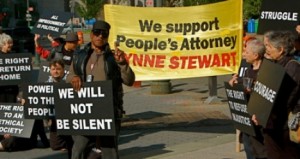
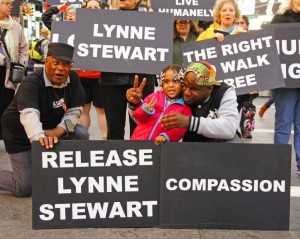
Historic Vigil And Compassionate Release For Lynne Stewart
It’s been seven weeks since Warden Jody Upton of FMC Carswell approved Compassionate Release for Lynne Stewart. This decision was based on the medical findings of Stage 4 cancer that spread Lynne’s scapula, lymph nodes and lungs. A massive vigil was held last week for Lynne at Federal Bureau of Prisons Headquarters in Washington DC. We’re joined today by former Attorney General of the United States Ramsey Clark who is helping to get Lynne Stewart released from prison.
Attorney Ramsey Clark:
- The matter is now on the desk of the director of the Federal Bureau of Prisons, it’s been there for about five or six weeks which is intolerably long because everyday counts.
- Lynne is in physical desperate condition, her cancer is spreading. She has appointments at Sloan Kettering when she gets out that may extend her life.
- It’s slipping away while the director of the Federal Bureau of Prisons who seems to be opposed of Compassionate Release or any broad application of it, sits on her application.
- Charles Samuels, seemed to have isolated himself from this issue. Any letters to Director Samuels would be helpful and important.
- He’s being bombarded but for some reason, he’s holding out because he wants an interpretation of the compassionate release statute that would enable the release of only those who are going to die in the very near future, have no hope of living longer.
- Right now we have an urgent human matter, a very wonderful human being, mother and grandmother is dying in prison.
- Please Write to: Charles E Samuels Jr. / Federal Bureau of Prisons / 320 1st Street Northwest / Washington DC 20534
Guest – Attorney Ramsey Clark was the former Attorney General of the United States, under President Lyndon B. Johnson. He was the first Attorney General at the Justice Department to call for the elimination of the death penalty and all electronic surveillance. After he left the Johnson administration, he became a important critic of the Vietnam War and continued defending the rights of people worldwide, from Palestinians to Iraqis, to anyone who found themselves at the repressive end of government action.
—-
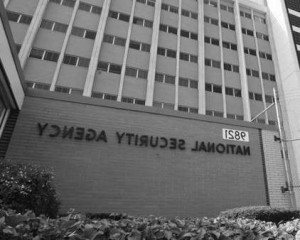
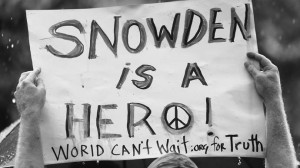
Whistleblower Cases Update
Attorney Michael Ratner:
- June 19th Anniversaries: Execution of the Rosenbergs. Julian Assange 1 year at the Ecuadorian embassy.
- Snowden, we don’t know where he is, massive revelations.
- The question you should be asking, is Dick Cheney a traitor? Is George Bush a traitor? Aren’t those the real traitors, the real people to be held accountable.
- We should look at what they told us. Ed Snowden told about a massive domestic surveillance operation.
- Their job is to tell the American people what they’re doing so we can debate it and discuss it and not put forward basically false stories of who they’ve purportedly stopped.
- This is about knowing where everyone of us is all the time.
- Freedom of the Press Foundation – Bradley Manning
- This is really a war on whistle-blowers and really a war on the United States trying to keep control on all of the information it can and control the internet from the top down.
Richard Falk, U.N. Rapporteur on Palestinian Rights, Calls for Close of UN Watch
——
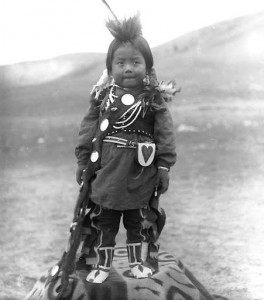

Lakota Indians To File UN Genocide Charges Against US, South Dakota
There was a time in the mid 1800s when the territory of Lakota Indians reached 90 million acres, now they’re separated into tribal councils and relegated to reservations. Their children are seized and put into foster homes of white families. During Republican administrations, more than 700 Lakota children are taken annually by a private corporation called the South Dakota Children’s Home Services. In April, a grassroots movement led by Lakota grandmothers touring the country built support for a formal UN complaint of genocide against the United States government and constituent states.
Attorney Daniel Sheehan:
- There’s basically a decade involved here during which the state of South Dakota engaged in a systematic program of the removal of Lakota children from their parents, from their extended families and from their entire tribe.
- Some 740 Lakota children a year during that period were taken from their families and tribes.
- Over half of them were never returned. 80-90 percent of those children were placed in white foster care.
- This is clear violation of the Indian Child Welfare Act which was the piece of legislation that mandated that if an Indian child were taken from the child’s parents they were required to be placed with Native American people.
- This is has been absolutely openly defied by the state of South Dakota.
- There has been an official notice of intent to file the complaint with the United Nations.
- We need to understand that there has been a longstanding policy in the Republican Party. When the Republican Party comes into power in Washington DC where they engage in this process to try and assimilate the native tribes.
- They’re constantly trying to eliminate the ownership of land and integrate them into society, basically to eliminate their culture.
- That was why the US Congress back in 1978 made the move to establish the American Indian Policy Review Commission and the Indian Child Welfare Act to stop the states from engaging in that type of activity of assimilation.
- What we’ve seen by William Janklow, a former South Dakota congressman, governor, and attorney general, is the process to attempt to take as many of the children away as they could possibly do and place them in huge group homes such as South Dakota Children Homes Services Inc.
- There is a subtext to this issue. We’ve discovered that during the Bush Administration from 2001 to 2009 there was systematic program of funneling federal funds into South Dakota to finance the seizure of these children and a substantial portion of that money from the Federal Government was transferred to the pharmaceutical corporations, who were in fact administering involuntarily to these children, pharmaceutical drugs Zoloft, and other psychoactive drugs to control their moods and attitudes.
- They refuse to give information about who the children are, where they’ve been taken, where they’ve been placed, some of them have been taken out of the state, we traced a number of them to Utah.
Guest – Daniel Sheehan is the lead attorney and general counsel for the Lakota People’s Law Project (LPLP). Currently, LPLP is working in South Dakota to stop violations of the Indian Child Welfare Act (ICWA) and rescue Lakota children from an abusive state care system. Award-winning journalist Laura Sullivan has just completed a hard-hitting investigative series on the situation in Lakota Country airing now on NPR. To learn more about Daniel Sheehan’s work with Lakota Indians, visit the Lakota People’s Law Project website. Sheehan traced the institutionalization of state kidnapping of Native children back to the late William Janklow, a former South Dakota congressman, governor, and attorney general notorious for his role in what the the Lakota refer to as the “Reign of Terror” on the Pine Ridge Reservation in the years following the American Indian Movement-led occupation of Wounded Knee in 1973. According to Sheehan, members of the George W. Bush administration tipped off Janklow on a Texas strategy to grab millions of dollars in federal subsidies by administering a psychological test devised by the Eli Lilly pharmaceutical corporation to children taken into protective custody. Replicating the strategy, South Dakota developed a mental health test failed by 98% of Native children, who then become “special needs” cases under federal law, with the state receiving up to $79,000 for each Indian child and the child being placed involuntarily on psychoactive drugs.
——————————————————————–
CIA Sponsored Terror, Civil Liberties, Criminalizing Dissent, Human Rights, Military Tribunal, Political Prisoner, Supreme Court
Podcast: Play in new window | Download
Updates:
——
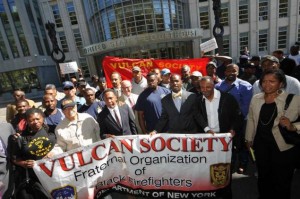

Court Upholds Broad Injunction to Remedy FDNY Discrimination
We talk today about recent developments in the New York City Fire Department discrimination case known as the US and Vulcan Society v. City of New York. Last week, a three-judge panel of the Second Circuit Court of Appeals held that, in light of the City’s “distressing pattern of limited FDNY minority hiring,” broad relief ordered by the district judge to end discrimination in the FDNY was “entirely warranted.”
This decision includes an independent monitor in order to “oversee the FDNY’s long awaited progress toward ending discrimination.” The Court also ruled that the plaintiffs’ intentional discrimination claim should proceed to a trial. The district court had found that the evidence of intentional discrimination was so overwhelming that no trial was necessary. The Court of Appeals also reinstated the plaintiffs’ claim that former FDNY Commissioner Nicholas Scoppetta is individually liable for intentional discrimination.
Attorney Dana Lossia:
- The Vulcan Society which is our client, a fraternity of black fire fighters sued the city of New York and said that the reason why the fire department back in the 60s and 70s was virtually all white was because of the hiring process that the city was using, it was discriminatory, it was unlawful.
- A federal judge agreed back in 1973 and ordered the city to hire one minority firefighter for every 3 white firefighters that was hired.
- Decades went on, we get up to the 90s and you look at the FDNY and it’s still 3 percent African American.
- It instituted the quota that was required for the bare minimum amount of time that was required and then it reverted to the all white club that the fire department has been its entire history in New York City.
- In a city that is 25 percent African American or more and 25 percent Latino.
- We made the case that not only was the city using these exams but they were continuing to use them with the knowledge and intent to perpetuate the fire department as it has existed.
- So that fathers could bring their sons and their nephews into the force and it would stay the way it had always been which is virtually all white, more than 90 percent white.
- The District Court Judge in Brooklyn agreed with us he said this was clearly intentional discrimination. He issued a remedial order requiring broad oversight of the FDNY hiring process.
- The city didn’t like that, they appealed to the Court of Appeals. The Court of Appeals came down with a decision that largely upheld this very broad and deep oversight on everything the city does to hire firefighters.
- Every other fire department in a big city across the country is more racially diverse than in New York City.
- Back in the 80s women came into the fire department and face horrible harassment and retaliation.
- One of the things we learned is that fire fighting is less dangerous than construction work, its far less dangerous job than being a police officer, a roofer.
- Fire fighters are revered wherever they go and the job is much much more safe than sanitation work.
Guest – Attorney Dana Lossia (Northwestern University, B.A., summa cum laude 2001, Harvard Law School, J.D., 2005) joined Levy Ratner in December 2005. She represents unions in New York and New Jersey in arbitrations, administrative proceedings, NLRB cases and federal and state court litigation. She also represents plaintiffs in complex employment discrimination actions, including a challenge to racially discriminatory hiring practices at the NYC Fire Department. Lossia has also litigated on behalf of tenants in land use and zoning appeals before the NYC Board of Standards and Appeals.
—-
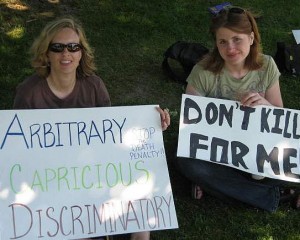
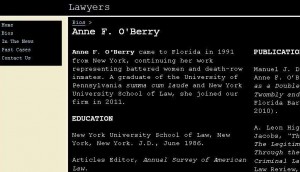
Lawyers You’ll Like: Anne O’Berry
As part of our Lawyers You’ll Like series we’re joined by attorney Anne O’Berry, she’s the Vice President of the Southern Region of the National Lawyers Guild and the author of The Law Only As An Enemy: The Legitimization of Racial Powerlessness Through the Colonial and Antebellum Criminal Laws of Virginia. While in law school, she served as Director of the Women in Prison Project at Rikers Island, where she taught incarcerated women how to prevent termination of their parental rights. In the last 12 years, Anne has served as counsel at a Florida law firm that specializes in class action litigation, particularly in the areas of securities, consumer and economic fraud, as well as some environmental and privacy rights litigation.
Attorney Anne O’Berry:
- We did a lot of historical research in terms of racism and the law back in pre-civil war Virginia.
- We focused on Virginia because it was a paradigm for slavery basically in the slave laws that were in place.
- We wrote an article for publication, it was published in the University of North Carolina law review. The Law Only As An Enemy:’ The Legitimization of Racial Powerlessness Through the Colonial and Antebellum Criminal Laws of Virginia.
- Depending on your status, if you were a free white person or a slave, you were treated differently by the law.
- As an overall theme, depending on the race of the victim was that would effect what your sentence would be.
- For example, if a black woman was raped, that was not considered a crime. If you were a black person and you stole something, you would be put to death.
- It was ironic for the slave owner because if their slave was put to death, they would have to be compensated by the state.
- If the victim was black, the crime was treated less seriously than if the victim was white.
- I started out working at a firm in New York, a large prominent, Wall Street type.
- Among some people I was known as the pro-bono queen.
- I was there for 2 and a half years and the first pro-bono case was a death penalty case.
- The court ruled back then (1990s) that it was ok to execute the mentally retarded.
- I was so moved by that experience that I gave up my cushy job in New York and go do death penalty work full time.
- I ended up at the Federal Resource Center doing death penalty work in Tallahassee Florida.
- I worked for the Battered Women’s Clemency Project in Florida.
- More recently the Supreme Court did rule that it is unconstitutional to execute people who were juveniles at the time of the offense and unconstitutional to execute people who are mentally retarded.
- I believe in my lifetime we will see the end of the death penalty in this country.
- It’s just an amazing system that we have where the courts will say – yes you’ve got compelling evidence of innocence but we’re not going to hear your case.
- I would say what got me through was the victories.
- Presently, I’m working with an attorney Jim Green, who’s a prominent civil rights attorney in West Palm Beach, kind of a legend down here.
- I also some volunteer work with El Sol. It’s a day laborer center in Jupiter, Florida.
Guest – Anne O’Berry, National Lawyers Guild’s Regional Vice President for the Southern Region and a member of the Guild’s South Florida chapter. She obtained her undergraduate degree from the University of Pennsylvania in 1983 and her law degree from New York University Law School in 1986. While in law school, she served as Director of the Women in Prison Project at Rikers Island, where she taught incarcerated women how to prevent termination of their parental rights. She was a member of the law school’s civil rights clinic and an editor on one of the law school’s journals, and authored a law review article on prisoners’ rights.
—
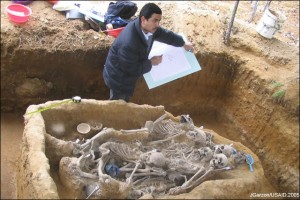
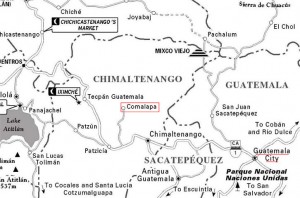
Guatemalan Ex Dictator Found Guilty of Genocide
After weeks of powerful testimony the trial of former Guatemalan dictator Efraín Ríos Montt and his intelligence chief José Rodríguez Sánchez ended with a guilty conviction on charges of genocide and crimes against humanity. The verdict marked the first time a former head of state had been found guilty of genocide in his or her own country.The government’s lead prosecutor, Orlando López, gave more than two hours of summation based heavily on the Guatemalan military plans, manuals, and operational records entered as evidence. During the months of General Ríos Montt’s rule, the army used a scorched-earth policy to flush out leftist guerrillas fighting in the hills. The villages of the Mayan highlands suffered the worst of the army’s brutality in the early 1980s, during Guatemala’s 36-year civil war.
Kate Doyle:
- I’m one of a couple of analysts that look at foreign policy in Latin America. My specialty is Central America and Mexico and I’m the director of something called the Evidence Project at the Archive, which is a way of connecting the right to information, right the truth with human rights and justice struggles around the region.
- We’ve worked very closely with truth commissions, with prosecutors and judges to try to get some of the classified US documents and sometimes even the national documents from their countries in to their hands when they’ve got a human rights investigation underway.
- The impetus for this case really came from the affected communities themselves that is in this case, the community of the Mayan Ixil.
- In the Northwestern part of the country, which worked for decades to identify exhumation sites. Sites where they knew there were clandestine mass graves of their own mothers, fathers, children who had massacred during the scorched earth operations of Rios Montt in 1982 and 1983.
- In March of 1982, Rios Montt headed a trio of military officers that overthrew the previous president. There was a guerrilla armed insurgency underway in Guatemala and had been since the 1960s. Rios Montt decided he was going to launch a series of counterinsurgency operations not only to target the armed insurgents in the highlands but also to destroy or eliminate their social base.
- That meant going after communities of mostly Mayan peoples that lived in the same area where the insurgents operated. It’s one of the most brutal acts of what used to be called low intensity warfare.
- The officials that carried out those operations were left to enjoy total impunity after the regime ended some 17 months later.
- Prosecutors and both the government prosecutors and civil prosecutors who represent the victims who also get to sit at the table ask questions and participate in the investigation pulled together a real interesting case for genocide and crimes against humanity.
- I’ve been working with those prosecutors for years to help them incorporate both declassified US documents as evidence in the case but also those Guatemalan military archives.
- Because of the very tight relationship between the United States and the Guatemalan regime of Rios Montt and predecessor regimes, we knew these agencies would have countless records of the operations themselves of the Guatemalan military structure of command and control.
- Some of the most extraordinary testimony for me came from women because the Guatemalan military like many militaries in these irregular wars used sexual abuse and violation as a part of their counterinsurgency tactics and they actually talk about the destruction of the “semia” the seed.
- The day the verdict came down, the court that seats about 500 people, was absolutely packed to the gills, so every seat was full. When the mood in the room began to feel tense, because of the intensity of the verdict and what that meant for Guatemala. Everybody began to stand up and sing this beautiful song, this poem that was set to music by a Guatemalan musician, over and over again and brought the tension down slowly slowly, it was one of the most beautiful moments I’ve ever witnessed in a court room.
- The Guatemalans were focused on legally convicting the authors of genocide, and they did it.
Guest – Kate Doyle, a Senior Analyst of U.S. policy in Latin America at the National Security Archive. She directs several major research projects, including the Guatemala Project, which collects declassified U.S. and Guatemalan government documents on the countries’ shared history from 1954, and the Evidence Project, connecting the right to truth and access to information with human rights and justice struggles in Latin America. Since 1992, Doyle has worked with Latin American human rights groups, truth commissions, prosecutors and judges to obtain government files from secret archives that shed light on state violence. She has testified as an expert witness in numerous human rights legal proceedings, including the 2008 trial of former President Alberto Fujimori of Peru for his role in overseeing military death squads; the case before the Spanish National Court on the 1989 assassination of the Jesuit priests in El Salvador; and the 2010 trial of two former policemen in Guatemala for the forced disappearance of labor leader Edgar Fernando García in 1984
———————————————————
Civil Liberties, Criminalizing Dissent, FBI Intrusion, Habeas Corpus, Human Rights, Political Prisoner, Prison Industry, Supreme Court, Torture, Truth to Power
Podcast: Play in new window | Download
Updates:
—
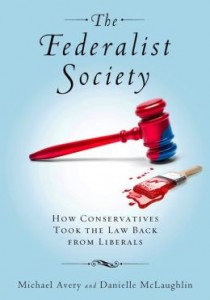

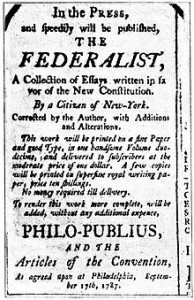
The Federalist Society: How Conservatives Took the Law Back from Liberals
Has the Department of Justice been taken over by a conservative organization little known to the average citizen? In the recently published book titled The Federalist Society: How Conservatives Took the Law Back from Liberals authored by attorney Michael Avery and Danielle McLaughlin track the movements of a small group of conservative law students and their influence. The Federalist Society has lawyer chapters in every major city in the United States and student chapters in every accredited law school. Members include economic conservatives, social conservatives, Christian conservatives, and libertarians. They all differ with each other on significant issues, but cooperate in advancing a broad conservative agenda.
Attorney Michael Avery:
- I saw how much power and influence the Federalist Society had during the years George W. Bush was president and at the same time I realized most people don’t know very much about them.
- They remained under the radar, I thought it was important to tell their story.
- They came along just at the right time for them, it was really kind of a perfect storm for them. Ronald Reagan was in the White House, you had a general renaissance of conservative thought that was promoted by people like Bill Buckley in the National Review, you had resistance to school integration and forced bussing. So there was a backlash waiting to happen against some of the things that happened in the law.
- It’s very important to recognize the role Ed Meese played. First he was counselor to the president then he was attorney general, later he became a principle figure at the Heritage Society.
- Many people are open members of the Federalist Society, others not so much but through a variety of sources I think we’re very confident that the people in that appendix either are members or very close to the society and sometimes I call that list the 100 most powerful people in the country and most of them you never heard of.
- About half the members that George W. Bush appointed to the Federal Court of Appeals were members of the Federalist Society.
- This battle over whether the government is able regulate private property has been one of the principle ideological battles of American Constitutional law since the end of the 19th century.
- They argue that property rights are a natural right that everybody is entitled to.
- It’s better to tolerate disagreement than to try to be 100 percent correct all the time.
Attorney Danielle McLaughlin:
- The substantive areas of law that we’re seeing this test cases brought in are very much reflective of the core values of the society. Those are notions of small government in particular small federal government. The idea that the state exists to preserve freedom.
- Many are involved in public interest law firms who go out and find plaintiffs and challenge regulation at the state level and in many cases have been successful in challenging laws in opposition to their world view all the way up to the Supreme Court.
- They really worked this very large network that they developed.
- Olen Foundation says here’s some money go out and build an institution.
- The Federalist Society today is not handicapped by having to report back or meet short term goals. The conservative funders believed in long term institution building.
- There are Federalist Society student groups on the campus of every single accredited and some unaccredited law schools. There are lawyer chapters in every single major city. There are affiliated Federalist Society groups outside the country.
Guest – Civil rights lawyer Michael Avery, professor at Suffolk University Law School and former president of the National Lawyers Guild from 2003 to 2006.
Guest – Co-author and attorney Danielle McLauglin, member of the Litigation and Dispute resolution group.
—–
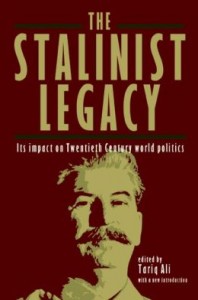
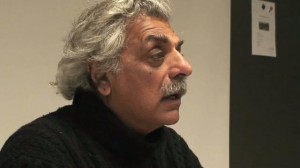
The Stalinist Legacy: Its Impact on Twentieth Century World Politics
We go now to hear a presentation by internationally acclaimed Pakistani writer and film maker Tariq Ali during a New York City book launch of his new book The Stalinist Legacy: Its Impact on Twentieth Century World Politics. Karl Marx’s often quoted observation “History weighs like a nightmare on the brain of the living” is so true. Even 20 years after the Soviet Union’s collapse, activists are still confronted by the legacy of Stalinism at the same time capitalism has failed millions of working people in the United States and across the world.
————–
CIA Sponsored Terror, Civil Liberties, Criminalizing Dissent, Extraordinary Rendition, Habeas Corpus, Human Rights, Political Prisoner, Prison Industry, Prosecution of the Bush Administration, Supreme Court, Targeting Muslims, Torture, War Resister
Podcast: Play in new window | Download
Updates:
- Please Sign the Lynne Stewart Compassionate Release Petition
- Please Also Write to: Charles E Samuels Jr. / Federal Bureau of Prisons /
- 320 1st Street Northwest / Washington DC 20534
- Anniversary of Collateral Damage Video Release
- University Stadium Victory – GeoCorp Prisons
—
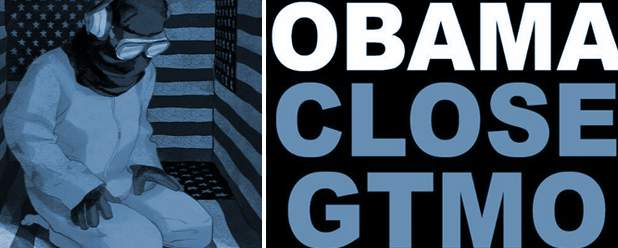
Guantanamo Hunger Strike Update
Attorney Omar Farah speaks with Michael Ratner about a hunger strike at Guantanamo Bay Prison with more than half of prisoners from Camp 5 and 6f participating. Farah says the hunger strike was triggered by an arbitrary crackdown by the prison administration including cell searches and a search of the prisoner’s Qurans. This is viewed as out right desecration. More than half of the entire prison population has been cleared for release by every prominent national security and law enforcement agency in the US government, that includes the DOD, DHS.
Guest – Omar Farah joined the Center for Constitutional Rights in 2012 as a staff attorney in the Guantanamo Global Justice Initiative. Omar was previously in private practice, working mostly in the area of international commercial arbitration. Since 2008, he has represented several prisoners detained at Guantanamo Bay in habeas corpus litigation in federal court.
———


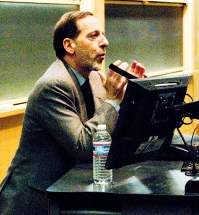
Brokers of Deceit: How the U.S. Has Undermined Peace in the Middle East
While adviser to the Madrid and Washington Palestinian-Israeli negotiations, author and historian Rashid Khalidi collected documents, memos and meeting minutes as a research foundation for his recently published book Brokers of Deceit: How the U.S. Has Undermined Peace in the Middle East. The book focuses on 3 periods of opportunity for the United States to broker peace, one in the late seventies, the early nineties and 2010. This critical analysis addresses the basic distortions in language that has corrupted the peace processes. Rashid Khalidi is an American historian of the Middle East, the Edward Said Professor of Modern Arab Studies at Columbia University, and director of the Middle East Institute of Columbia’s School of International and Public Affairs, he joins us today to talk about his book and also the ongoing destabilizing hostility in Syria.
Professor Rashid Khalidi:
- Let me read to you what Orwell says, “the slovenliness of our language makes it easier for us to have foolish thoughts. If thought corrupts language, language can also corrupt thought. Bad usage can spread by tradition and imitation even by people who should and do know better.”
- The argument I’m making in this book is much of the language used by pundits and politicians about the Middle East and the so called peace process, between the Palestinians and the Israelis is really corrupt language.
- One of the chapters in the book is devoted to the period when I was an adviser to the Palestinian delegation and negotiations from 1991-1993 starting in Madrid and continuing to Washington.
- If you go back to Madrid in October 1991, there were under 200 thousand Israelis living in the occupied West Bank and occupied East Jerusalem. Today, there are nearly 600 thousand of them.
- United States has been responsible for exacerbating the problem in effect by saying the only way to deal with this issue of occupation and settlement is through negotiations mediated by us.
- The United States in the meantime has put its big thumb on the scale in favor of the Israelis preventing a resolution of the problems.
- The first episode I talk about in the book has to do with the follow on to Camp David in the wake of the Lebanon War in 1982 when Israel invaded and 50 thousand Palestinians and Lebanese were killed and wounded.
- I site at great length a now declassified document by a CIA analyst which one of my students actually found.
- The idea of Palestinian self determination doesn’t exist anywhere in the Oslo Accords signed by the PLO and Israel in 1993 and afterward.
- Autonomy and self determination are used by people in American political parlance and Israeli political parlance in ways that do violence to the real meanings of these words.
- Obama fits the pattern of every president since President Carter, with the sole exception of George W. Bush.
- Obama has adopted wholesale and entire Israeli narrative as to the idea that Israel is the victim.
- There is a people in existential danger that’s the Palestinians, the people faced with elimination, extermination, not physically but as a collective.
- Oslo was a terrible deal for the Palestinians. As a result of Palestinian failures since the 90s, a situation has emerged where we have one state and one sovereign body between the Mediterranean and the Jordan River.
Guest – Professor Rashid Khalidi, is the Edward Said Professor of Arab Studies at Columbia University. He received his B.A. from Yale University in 1970, and his D.Phil. from Oxford in 1974. He is editor of the Journal of Palestine Studies, and was President of the Middle East Studies Association, and an advisor to the Palestinian delegation to the Madrid and Washington Arab-Israeli peace negotiations from October 1991 until June 1993.
—–
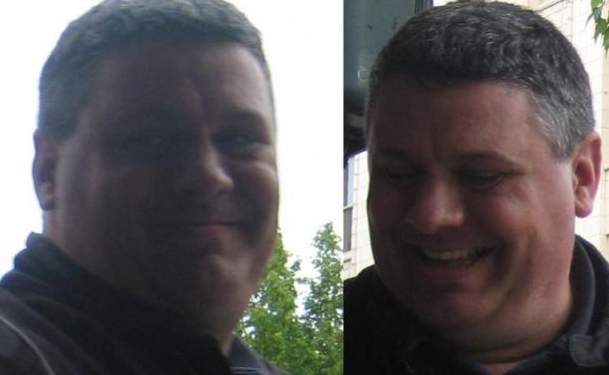
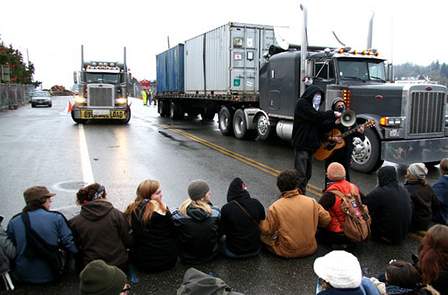
Judge Oks Civilians Right to Sue Military For Spying On Peace Activists
In a recent ruling, the Ninth Circuit Court of Appeals ruled that a lawyer’s challenge to military spying on peace activists can proceed. This ruling is the first time a court allowed civilians to sue the military for violating their First and Fourth Amendment rights. National Lawyers Guild attorney Larry Hildes brought the lawsuit Panagacos v Towery in 2009 on behalf of a group of Washington state antiwar activists who discovered they were infiltrated for 2 years by John Towery, an employee at a fusion center inside a local Army base. The antiwar activists group Port Militarization Resistance sought to oppose the wars in Iraq and Afghanistan through civil disobedience. The lawsuit also names, the Army, Navy, Air Force, FBI, CIA, Department of Homeland Security and other law enforcement agencies.
Attorney Larry Hildes:
- Brendan Dunn was activist in Olympia, he was arrested in Seattle basically for sitting while anarchist.
- The Olympia Police Department cracked down on the Wobblies and the IWW for having newspaper boxes for which they paid for and took all the papers.
- We got them back, but Brendan got curious about what was going on, did a state public records act request for all emails and all intelligence to the city of Olympia concerning anarchists or the IWW.
- What he got back instead was hundreds and hundreds of pages of what are called “force protection memos” and “threat assessments” from Ft. Lewis about Port Militarization Resistance, a group that he was involved with that did protest against the use of public ports for shipment of Striker Brigade equipment to the occupation in Iraq and Afghanistan.
- He started looking at them and every police department and every military agency from north of Seattle to Portland was on this list. The FBI was on this list, Homeland Security, every branch of the military.
- It was detailed discussions of what PMR was planning, what they were going to do, how to fight it. The author of a lot of this was John Towery.
- PMR looked Towery up on Facebook and there’s a picture on Towery’s FB page of John Jacob who had been coming to PMR meetings for several years. Very closely involved with PMR in fact he ran their list serve on Rise Up.
- So they did some more checking. They looked up his voter registration, they got an address and the address matched John Jacobs.
- He was 20 years older than everyone else. I don’t know how but he blended in. He went to events, he brought his kids. He was very very good at what he did.
- Brendan considered him a close friend. Brendan and another member confronted him at a cafe in Tacoma and he said “yes, I’ve been spying on you. I’m doing it for your own good, there are other spies watching you that mean you much more harm than I do.”
- We do know that the Army at least one more spy. We caught the Coast Guard spy. There were 2 officers from the Tacoma Police Department’s Homeland Security Committee.
- The police would show up at unannounced demonstrations. The MP’s, local police and state patrols would already be there and everyone would be arrested as they were getting out of their cars.
- The Portland Militarization Resistance was a few dozen people. They were very creative, they had figured out a choke point for the military.
- The equipment would go out 3 weeks before the troops. If they couldn’t get the equipment there. They couldn’t send the troops.
- If they couldn’t send the equipment and the troops then no war.
- The succeeded in scaring the heck out of the military by these very peaceful acts of civil disobediance.
- They can’t arrest them before they get to the demonstration or before they even do anything.
- They think dissent against their wars is the enemy which scares me a great deal.
- Where else are they doing this, how much are they doing this?
Guest – Attorney Larry Hildes, an NLG member and one of the attorneys involved in bringing the case Panagacos v Towery.
————————————————————————–
Civil Liberties, Cuba, Human Rights, Supreme Court, Truth to Power
Podcast: Play in new window | Download
Updates:
- MOMA Suggested Donation Lawsuit
—-

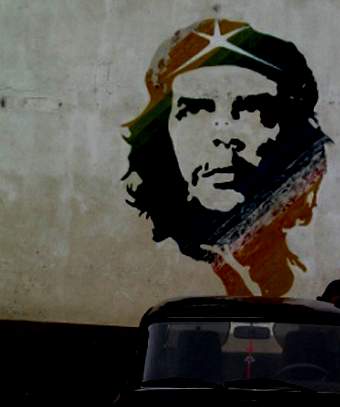
Michael Smith and Dennis James Discuss Cuba Trip
Co-host Michael Smith and attorney Dennis James recently returned from Cuba on a trip led by the Center for Cuban Studies. Dennis is a civil rights lawyer formerly of Detroit and former Executive Director of the National Lawyers Guild. The trip was undertaken to appreciate the fundamental changes now going on in Cuban law with respect to travel, home, car and business ownership. The discussion leads into the possibilities of an economic rejuvenation in Cuba.
Attorney Dennis James:
- The people of Cuba had a strong identification with the revolution they made.
- Cuba is theirs and nobody else is going to tell them how to run it.
- They have a lot of complaints about shortages, but they’re very appreciative of the basic needs of life that are provided for.
- The Cuban government did a thorough and multi-level canvassing of the population through its national assembly and committees for the defense of the revolution.
- Talking to the people on the street, they remember this process that went on.
- The government watches which enterprises make sense, which ones are succeeding.
- The ones that are succeeding and paying taxes, employing people are encouraged.
- Book: The Man Who Loved Dogs
- Book: Cuba, What Everyone Needs To Know – Julia Sweig
- There’s a colony of people in Melia Cuba that practice what they call naive art.
- I think its naive in the sense that it’s self taught.
- They do wonderful paintings, these are doctors, lawyers, bakers, bus driver, cops, sugar mill workers.
- Their work is encouraged, given exhibits in Havana.
- Sandy Levinson – The Center for Cuban Studies.
- We’re not talking about the flag waving, hammer and sickle brandishing socialist realism of China and Russia, we’re talking about wonderful expressions of culture.
Guest – Dennis James, a civil rights lawyer formerly of Detroit and former Executive Director of the National Lawyers Guild.
——–
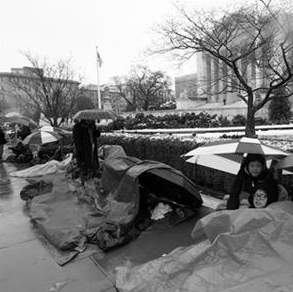
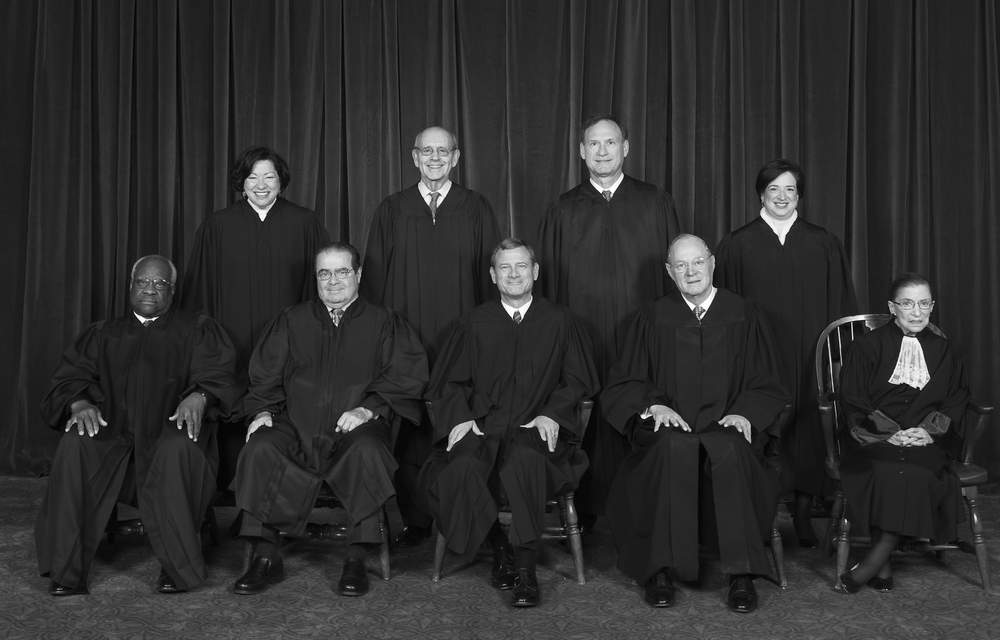
Supreme Court On Gay Marriage
Last week the Supreme Court heard oral arguments on two historic cases that could establish the constitutional right for gay marriage. The first case, Hollingsworth v. Perry is a challenge to California’s voter-approved ban of same-sex unions in 2008. Six months after the California Supreme Court endorsed gay marriage, voters passed Proposition 8 which amended the state’s constitution to only recognize marriages between a man and a woman. Lower courts had declared the gay marriage ban to be unconstitutional. The second case the Supreme Court heard was a challenge to the 1996 Defense of Marriage Act. This act bars married gay couples from receiving federal marriage benefits such as Social Security and family medical leave.
Professor Katherine Franke:
- On the Prop 8 case, I would certainly question the issue of standing which the court is from their argument also taking quite seriously.
- It’s actually an incredibly important issue in civil rights law where groups of people want to assert an interest in an overarching public issue like the right to marry.
- I’m of the view that this should never have been brought.
- The movement lawyers really argued for Boise and Olsen not to bring the case. Boise and Olsen lobbied quite hard to keep the movement lawyers out of the case.
- When the law gets out ahead, and the lawyers get out ahead of the movement that support them, often we do more damage than good when we get to the Supreme Court too soon.
- We have movement lawyers in the lesbian and gay community and of course they don’t all agree with each other, its a complicated movement. But there was a sense that they were going to go state by state, and build legal consensus around the issue of marriage rights and around a set of arguments that weren’t going to hurt gay and lesbian people who didn’t marry.
- Boise and Olsen thought they would do a better job raising the issue of marriage than the movement lawyers have. They’re carrying a brief for marriage, not a community who have a diverse set of interests, marriage being only one of them.
- DOMA, the Defense of Marriage Act is a law that unfortunately President Clinton signed in 1996. It was basically a homophobic cry from the Congress to limit on the federal level any definition of a marriage to between a man and a woman.
- If you’re a federal employee, if you’re married you can put your spouse and dependent children on you health insurance.
- If you’re not married, you can’t.
- Edie Windsor is the plaintiff in the DOMA case but when her partner of many many years past away, Edie inherited under the will, her partner’s property they jointly owned together. Under federal tax law it says if they were strangers to one another, so Edie had to pay about 360 thousand dollars in inheritance taxes for the property she had owned with her partner.
- There was a coalition of large corporations that filed a brief and said actually
- The political alignment on this issue has really shifted at a rapid pace in the last year.
- I direct our center on gender and sexuality law.
- I’m actually now teaching for the first time a class on the law of occupation so we’re looking at Iraq and Palestine and the United States, Puerto Rico and Hawaii. To understand whether the law can be a force for good when military force is like the Israelis or like the Americans occupying other sovereign states.
- We’ve got a really great new project engaging tradition and thinking about arguments based in tradition, that have been used traditionally to undermine sexually based justice claims.
- Those issues come up in the marriage context all over the place.
Guest – Professor Katherine Franke, the Isidor and Seville Sulzbacher Professor of Law; Director, Center for Gender and Sexuality Law at Columbia Law School.
—————————————————————–






























